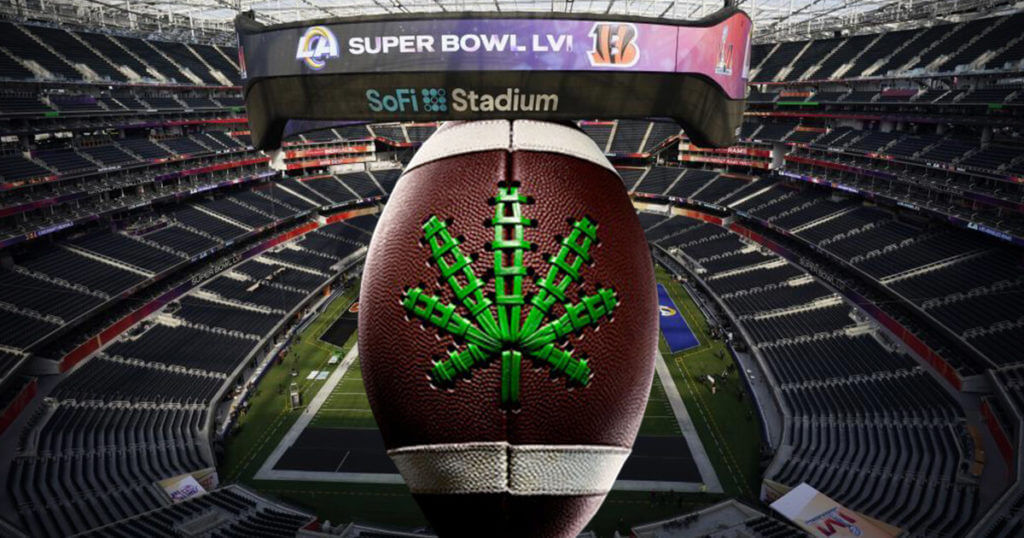Wow, what a Superbowl!
From kicking players off the field to investing $1million in research and development for player cannabis programs, the NFL has pulled quite an about-face when it comes to cannabis in the NFL organization.
The move has been a long-time coming for an industry that would benefit greatly from a comprehensive review of its player recovery strategies—especially when it comes to long-term recovery. Cannabis and pain management is studied in individuals from all walks of life and often results in beneficial treatment paths—so why has this been wiped from the table for the sportspeople and media stars of today?
In our previous article on the NFL and cannabis, we noted that a 2013 research piece by the Washington Post featured a poll on retired NFL players with depressing results. Nearly nine out of ten former players reported ongoing physiological discomfort, with a staggering 91 percent attributing their pain to a career in football. Even the majority of individuals who played professionally for only a short time experience lasting pains that influence their quality of life.
The shift in the NFL’s approach to cannabis signals great things to come, but we believe this change only happened on the back of public pressure—a concept we’ll explore in today’s article highlighting how we got here.
NFL And Cannabis “Crimes”
Random drug screening has been a regular part of NFL procedures. In the same way, the Olympics screen participants for drugs that could enhance performance so too does the NFL look for suspicious compounds in supplements and player samples. Some banned substances, such as Human Growth Hormone, are self-explanatory. However, Delta 9 THC-carboxylic acid, (the active chemical found in cannabis) has often been criticized as an outlier.
As of April 20, 2021 (also known as 4/20), the NFL announced that for the first time, Delta 9 THC-carboxylic acid would not be featured in the NFL drug screening program. Common sense had finally caught up with the organization, and players are now free to explore recreational and medical cannabis usage during their time off the field.
Couple this move with transparent funding now being given to organizations in cannabis research, and we see how the NFL has reversed its stance on what has been an elephant in the room of ethics since the organization’s inception—what to do with injured players.
Injury Recovery And Pharmaceuticals
The organization’s exploration of cannabis as a pain alternative first came in 2017 at a time when America’s opioid crisis has reached epidemic proportions—a consistent note in former US President Donald Trump’s public incense. Many people feel that marijuana is a safer, less addictive alternative to opiates. In football’s harsh ethos, the ability to recover quickly from injuries is not only crucial but it’s also expected as a given by coaches and sponsors.
In NFL locker rooms, bottles of hydrocodone, Vicodin, Percocet, Toradol, and Celebrex are common sights. The rush of chemicals, numbing agents, and addictive substances power a multibillion-dollar economy from behind the scenes.
As former athletes described how they would be given a harrowing mix of painkillers and anti-inflammatory injections to get them back on the green, we wonder how it has taken so long for the media giant to recognize cannabis as a non-addictive and holistic approach to injury management and recovery. Our suspicion: public opinion has historically trended only slightly upward for legalization, but in recent years, the popularity has exploded.
By acting now, the NF-L can leverage both public approval for cannabis (thus not upsetting sponsors) while also capitalizing on a rejection of pharmaceuticals for recovery paths.
Whether this boils down to marketing, a manipulative approach to players as disposable subjects in the game, or simply a response to years of player and fan pressure, we may never know. What we do know is that we support this move, and hope to see other sports institutions follow the NFL’s suit and offer cannabis as a recovery tool for players who deserve a high quality of life following their professional careers.
From punishing players to promoting cannabis off the field, we’re using this move by the NFL as a sign that cannabis compliance is shifting in the long run. We credit communities like our own followers for continuing to promote cannabis as a non-addictive recovery alternative and hope to see fruitful returns in NFL research that could benefit professionals in every field—from sports to crisis teams, laborers, and even high-stress office personnel.
For more cannabis news, visit Beard Bros Pharms and our up-to-the-minute news column.
















